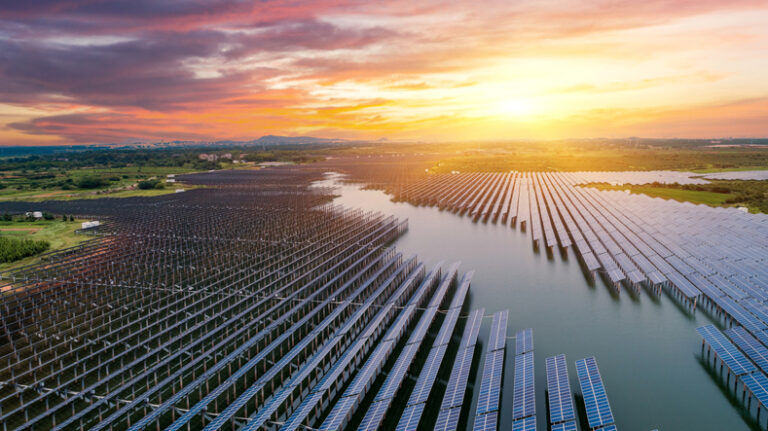Energy, finance and innovation: China’s global opportunity to be a stronger leader on climate change

China faces a golden opportunity to strengthen its climate leadership internationally in the areas of renewable energy, sustainable finance and innovation. Having already made important steps towards its climate goals domestically, the time is right for China to look globally, argues a new paper by leading policy advisors.
Internationalism in climate action and China’s role is authored by Danae Kyriakopoulou, Lucie Qian Xia and Chunping Xie from the Grantham Research Institute on Climate Change and the Environment at the London School of Economics and Political Sciences (LSE). The paper is both a recognition of China’s achievements to date and a call to action urging the nation to go further on international collaboration and coordination on climate action.
The authors find opportunities for China to demonstrate global leadership in relation to: its support for the world’s transition to renewable energy; its role as provider of finance and one of the world’s biggest creditors; and as a pioneer in research and innovation for green technologies and solutions.
The paper recognises the significance of China’s recent climate and environmental action including its pledge to reach peak carbon emissions by 2030 and carbon neutrality by 2060; its hosting of the COP15 United Nations biodiversity summit in October last year and April this year; and the US-China Joint Glasgow Declaration issued last year at the COP26 United Nations climate change summit.
But now is the time for China to go further, argue the authors, in engaging with the world on climate issues.
On the transition to renewable energy, the authors recommend that China should: expand its energy storage capacity; promote green hydrogen from electrolysis and upgrade the existing natural gas storage system to accommodate hydrogen; support further development of New Energy Vehicles (NEVs); increase distributed renewable generation in Central and Eastern China; and go further in reforming the electricity market.
China should also: collaborate with other counties to integrate renewables into the grid; contribute to increasing global investment in low-carbon industries; lead the world in nuclear power development; and play an important part in supporting low- and middle-income countries in transitioning away from fossil fuels.
On sustainable finance, the authors note that China’s role in the global financial system has grown substantially in the past two decades and is now one of the world’s largest creditors. They urge China to seize a major opportunity to demonstrate the clear and positive links between climate action and sustainable economic development through greening its investments along the ‘Belt and Road Initiative’.
Recommendations include that China should: focus on promoting sustainable economic development in the countries to which it lends to minimise the risk of climate-related debt crises; engage with fellow creditors through multilateral arrangements; continue and step up its participation in multilateral climate and sustainability initiatives; look to join initiatives such as the Coalition of Finance Ministers for Climate Action; and to encourage more of its private sector institutions to join the Glasgow Financial Alliance for Net Zero.
On fostering climate research, development and innovation, the authors recommend that China should aim to influence world standards, supply chains and drive innovation in technologies that will help combat climate change.
Danae Kyriakopoulou, senior policy fellow at LSE’s Grantham Research Institute on Climate Change and the Environment, said:
“As the world’s biggest greenhouse gas emitter and the largest developing country, with a population of 1.4 billion, China’s role in tackling the climate crisis is essential. The country has made great strides in meeting its climate obligations domestically, and now has a huge opportunity to show international leadership too.
“Our report focuses on an often-overlooked dimension: China’s role in international collaboration and coordination in climate action. This is becoming increasingly important reflecting growing and intensifying economic ties between China and the rest of the world, particularly emerging markets and developing economies. As these begin to chart their own paths to sustainable development, partnerships with China are poised to become more and more important.”
“The opportunities for China relate particularly to its roles as a source of investment in energy infrastructure, as a creditor and provider of sustainable development finance, and as a pioneer in research and innovation for green technologies and solutions.
“In this critical decade of the 2020s, China has the opportunity to further transform and upgrade energy and industrial structures, promote research, development and application of green and low-carbon technologies and intensify international climate cooperation. As the Chinese proverb says, ‘A journey of a thousand miles begins with a single step’. China could be an effective leader for raising climate ambition and accelerating climate action for a sustainable, more equitable and just world.”
Chunping Xie has also just published a new paper with Professor Nicholas Stern on how to improve flexibility in China’s power system to respond to the fluctuations in its supply and demand, for enabling better integration of intermittent renewables.
To see the full paper, or interviews with the authors, please contact Anna Ford on a.ford1@lse.ac.uk or gri.media@lse.ac.uk.
Notes to Editors:
- The Grantham Research Institute on Climate Change and the Environment was established in 2008 at the London School of Economics and Political Science. The Institute brings together international expertise on economics, as well as finance, geography, the environment, international development and political economy to establish a world-leading centre for policy-relevant research, teaching and training in climate change and the environment. It is funded by the Grantham Foundation for the Protection of the Environment, which also funds the Grantham Institute – Climate Change and the Environment at Imperial College London. www.lse.ac.uk/grantham/
- The views expressed in this report represent those of the authors and do not necessarily represent those of the host institutions or funders. The authors declare financial support from the Energy Foundation China – a professional grant-making charitable organisation registered in California, United States- and the Grantham Foundation for the Protection of the Environment and the London School of Economics and Political Science for the submitted work.

